#Environmentalism
Text
Here, have a spark of hope.
The reality is that no single person can fix the entirety of the current ecological imbalance that has been literally centuries in the making at this point. Yet there are so, so many of us who care, and who are doing what we can to make a difference in whatever every day to day ways we're able. I often think of conservation efforts like the Loren Eiseley story "The Star Thrower" (aka, "the starfish story"). Amid a beach full of stranded starfish, one person cannot possibly save them all, but they can spend what time they have saving those they're able.
And this study shows that these efforts do, in fact, make a difference, not just for starfish but a myriad of species. This meta-analysis of almost 200 studies definitively proves that conservation preserves and restores biodiversity, keeping more species from going extinct. It's all too easy to get entangled in the losses, but we even more need to allow ourselves to celebrate the wins.
That success is crucial to convincing governmental entities and other stakeholders that putting funds toward conservation efforts makes a significant difference and is not only worth the investment, but worth increasing. And, on a personal level, it's necessary for those of us who care so deeply for this world to know when our efforts are having an impact, to buoy us up when the anxiety and grief over ecological destruction wears us down.
There is hope. Keep it up, folks; it's helping <3
#conservation#environment#environmentalism#extinction#endangered species#animals#wildlife#biodiversity#nature#science#scicomm#hope#solarpunk#hopepunk#hopecore#hopeposting#optimism#ecology#habitat restoration#restoration ecology
428 notes
·
View notes
Text
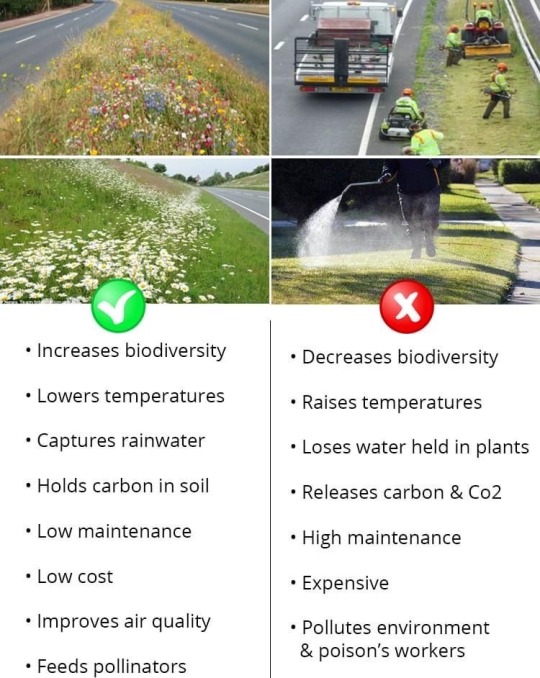
77 notes
·
View notes
Text

The youth are the future. Why else would the powers that be focus so intently on keeping them small, repressed and controlled? To those of us ushering in new futures, we understand that seeding hope and resilience in new generations is the actual key. Not silencing.
-qbv
#queerbrownvegan#sustainability#climate change#environmentalism#social justice#environment#climate crisis#environmental justice#activism#intersectional environmentalism#student protests
41 notes
·
View notes
Text

A.2.16 Does anarchism require “perfect” people to work?
No. Anarchy is not a utopia, a “perfect” society. It will be a human society, with all the problems, hopes, and fears associated with human beings. Anarchists do not think that human beings need to be “perfect” for anarchy to work. They only need to be free. Thus Christie and Meltzer:
”[A] common fallacy [is] that revolutionary socialism [i.e. anarchism] is an ‘idealisation’ of the workers and [so] the mere recital of their present faults is a refutation of the class struggle … it seems morally unreasonable that a free society … could exist without moral or ethical perfection. But so far as the overthrow of [existing] society is concerned, we may ignore the fact of people’s shortcomings and prejudices, so long as they do not become institutionalised. One may view without concern the fact … that the workers might achieve control of their places of work long before they had acquired the social graces of the ‘intellectual’ or shed all the prejudices of the present society from family discipline to xenophobia. What does it matter, so long as they can run industry without masters? Prejudices wither in freedom and only flourish while the social climate is favourable to them … What we say is … that once life can continue without imposed authority from above, and imposed authority cannot survive the withdrawal of labour from its service, the prejudices of authoritarianism will disappear. There is no cure for them other than the free process of education.” [The Floodgates of Anarchy, pp. 36–7]
Obviously, though, we think that a free society will produce people who are more in tune with both their own and others individuality and needs, thus reducing individual conflict. Remaining disputes would be solved by reasonable methods, for example, the use of juries, mutual third parties, or community and workplace assemblies (see section I.5.8 for a discussion of how could be done for anti-social activities as well as disputes).
Like the “anarchism-is-against-human-nature” argument (see section A.2.15), opponents of anarchism usually assume “perfect” people — people who are not corrupted by power when placed in positions of authority, people who are strangely unaffected by the distorting effects of hierarchy, privilege, and so forth. However, anarchists make no such claims about human perfection. We simply recognise that vesting power in the hands of one person or an elite is never a good idea, as people are not perfect.
It should be noted that the idea that anarchism requires a “new” (perfect) man or woman is often raised by the opponents of anarchism to discredit it (and, usually, to justify the retention of hierarchical authority, particularly capitalist relations of production). After all, people are not perfect and are unlikely ever to be. As such, they pounce on every example of a government falling and the resulting chaos to dismiss anarchism as unrealistic. The media loves to proclaim a country to be falling into “anarchy” whenever there is a disruption in “law and order” and looting takes place.
Anarchists are not impressed by this argument. A moment’s reflection shows why, for the detractors make the basic mistake of assuming an anarchist society without anarchists! (A variation of such claims is raised by the right-wing “anarcho”-capitalists to discredit real anarchism. However, their “objection” discredits their own claim to be anarchists for they implicitly assume an anarchist society without anarchists!). Needless to say, an “anarchy” made up of people who still saw the need for authority, property and statism would soon become authoritarian (i.e. non-anarchist) again. This is because even if the government disappeared tomorrow, the same system would soon grow up again, because “the strength of the government rests not with itself, but with the people. A great tyrant may be a fool, and not a superman. His strength lies not in himself, but in the superstition of the people who think that it is right to obey him. So long as that superstition exists it is useless for some liberator to cut off the head of tyranny; the people will create another, for they have grown accustomed to rely on something outside themselves.” [George Barrett, Objections to Anarchism, p. 355]
Hence Alexander Berkman:
“Our social institutions are founded on certain ideas; as long as the latter are generally believed, the institutions built on them are safe. Government remains strong because people think political authority and legal compulsion necessary. Capitalism will continue as long as such an economic system is considered adequate and just. The weakening of the ideas which support the evil and oppressive present day conditions means the ultimate breakdown of government and capitalism.” [What is Anarchism?, p. xii]
In other words, anarchy needs anarchists in order to be created and survive. But these anarchists need not be perfect, just people who have freed themselves, by their own efforts, of the superstition that command-and-obedience relations and capitalist property rights are necessary. The implicit assumption in the idea that anarchy needs “perfect” people is that freedom will be given, not taken; hence the obvious conclusion follows that an anarchy requiring “perfect” people will fail. But this argument ignores the need for self-activity and self-liberation in order to create a free society. For anarchists, “history is nothing but a struggle between the rulers and the ruled, the oppressors and the oppressed.” [Peter Kropotkin, Act for Yourselves, p. 85] Ideas change through struggle and, consequently, in the struggle against oppression and exploitation, we not only change the world, we change ourselves at the same time. So it is the struggle for freedom which creates people capable of taking the responsibility for their own lives, communities and planet. People capable of living as equals in a free society, so making anarchy possible.
As such, the chaos which often results when a government disappears is not anarchy nor, in fact, a case against anarchism. It simple means that the necessary preconditions for creating an anarchist society do not exist. Anarchy would be the product of collective struggle at the heart of society, not the product of external shocks. Nor, we should note, do anarchists think that such a society will appear “overnight.” Rather, we see the creation of an anarchist system as a process, not an event. The ins-and-outs of how it would function will evolve over time in the light of experience and objective circumstances, not appear in a perfect form immediately (see section H.2.5 for a discussion of Marxist claims otherwise).
Therefore, anarchists do not conclude that “perfect” people are necessary anarchism to work because the anarchist is “no liberator with a divine mission to free humanity, but he is a part of that humanity struggling onwards towards liberty.” As such, ”[i]f, then, by some external means an Anarchist Revolution could be, so to speak, supplied ready-made and thrust upon the people, it is true that they would reject it and rebuild the old society. If, on the other hand, the people develop their ideas of freedom, and they themselves get rid of the last stronghold of tyranny — the government — then indeed the revolution will be permanently accomplished.” [George Barrett, Op. Cit., p. 355]
This is not to suggest that an anarchist society must wait until everyone is an anarchist. Far from it. It is highly unlikely, for example, that the rich and powerful will suddenly see the errors of their ways and voluntarily renounce their privileges. Faced with a large and growing anarchist movement, the ruling elite has always used repression to defend its position in society. The use of fascism in Spain (see section A.5.6) and Italy (see section A.5.5) show the depths the capitalist class can sink to. Anarchism will be created in the face of opposition by the ruling minorities and, consequently, will need to defend itself against attempts to recreate authority (see section H.2.1 for a refutation of Marxist claims anarchists reject the need to defend an anarchist society against counter-revolution).
Instead anarchists argue that we should focus our activity on convincing those subject to oppression and exploitation that they have the power to resist both and, ultimately, can end both by destroying the social institutions that cause them. As Malatesta argued, “we need the support of the masses to build a force of sufficient strength to achieve our specific task of radical change in the social organism by the direct action of the masses, we must get closer to them, accept them as they are, and from within their ranks seek to ‘push’ them forward as much as possible.” [Errico Malatesta: His Life and Ideas, pp. 155–6] This would create the conditions that make possible a rapid evolution towards anarchism as what was initially accepted by a minority “but increasingly finding popular expression, will make its way among the mass of the people” and “the minority will become the People, the great mass, and that mass rising up against property and the State, will march forward towards anarchist communism.” [Kropotkin, Words of a Rebel, p. 75] Hence the importance anarchists attach to spreading our ideas and arguing the case for anarchism. This creates conscious anarchists from those questioning the injustices of capitalism and the state.
This process is helped by the nature of hierarchical society and the resistance it naturally developed in those subject to it. Anarchist ideas develop spontaneously through struggle. As we discuss in section I.2.3, anarchistic organisations are often created as part of the resistance against oppression and exploitation which marks every hierarchical system and can., potentially, be the framework of a few society. As such, the creation of libertarian institutions is, therefore, always a possibility in any situation. A peoples’ experiences may push them towards anarchist conclusions, namely the awareness that the state exists to protect the wealthy and powerful few and to disempower the many. That while it is needed to maintain class and hierarchical society, it is not needed to organise society nor can it do so in a just and fair way for all. This is possible. However, without a conscious anarchist presence any libertarian tendencies are likely to be used, abused and finally destroyed by parties or religious groups seeking political power over the masses (the Russian Revolution is the most famous example of this process). It is for that reason anarchists organise to influence the struggle and spread our ideas (see section J.3 for details). For it is the case that only when anarchist ideas “acquire a predominating influence” and are “accepted by a sufficiently large section of the population” will we “have achieved anarchy, or taken a step towards anarchy.” For anarchy “cannot be imposed against the wishes of the people.” [Malatesta, Op. Cit., p. 159 and p. 163]
So, to conclude, the creation of an anarchist society is not dependent on people being perfect but it is dependent on a large majority being anarchists and wanting to reorganise society in a libertarian manner. This will not eliminate conflict between individuals nor create a fully formed anarchist humanity overnight but it will lay the ground for the gradual elimination of whatever prejudices and anti-social behaviour that remain after the struggle to change society has revolutionised those doing it.
#faq#anarchy faq#revolution#anarchism#daily posts#communism#anti capitalist#anti capitalism#late stage capitalism#organization#grassroots#grass roots#anarchists#libraries#leftism#social issues#economy#economics#climate change#climate crisis#climate#ecology#anarchy works#environmentalism#environment#solarpunk#anti colonialism#mutual aid#cops#police
27 notes
·
View notes
Text





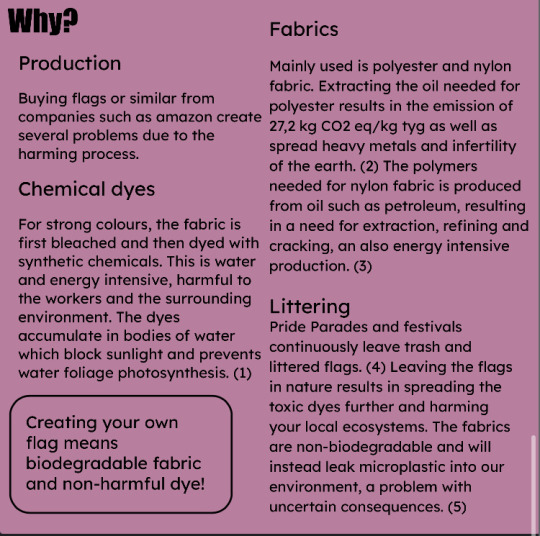

The results will be a unique and slightly rustic flag. In general, I want people to be aware of their impact when it comes to buying textiles, and that there is alternatives when wanting new clothing or similarities.
#environment#ecopunk#reduce reuse recycle#upcycle#recycling#lgbtqia#sustainability#ecofriendly#eco pride#diy#diy craft#cottagecore#pride#punk#environmentalism#natural dyes#dyeing
23 notes
·
View notes
Text

30-Minute Herby Meatballs With Creamy Kale Orzo
#eatfigsnotpigs#italian#dinner#savoury#meatballs#orzo#kale#vegan#vegetarian#food#recipe#recipes#climate change#global warming#sustainability#environment#environmentalism#climate action#climate crisis
23 notes
·
View notes
Text

114K notes
·
View notes
Text
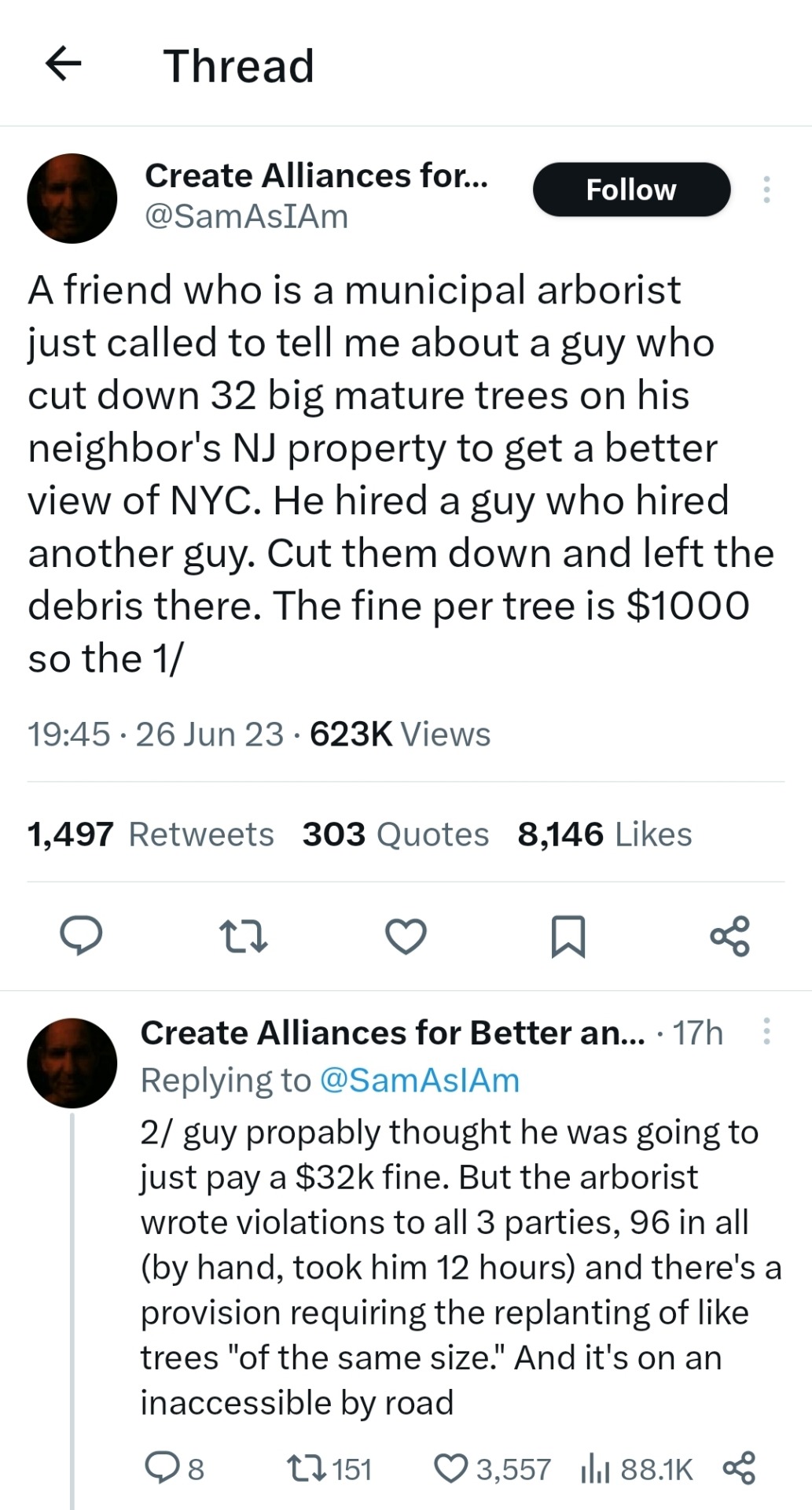
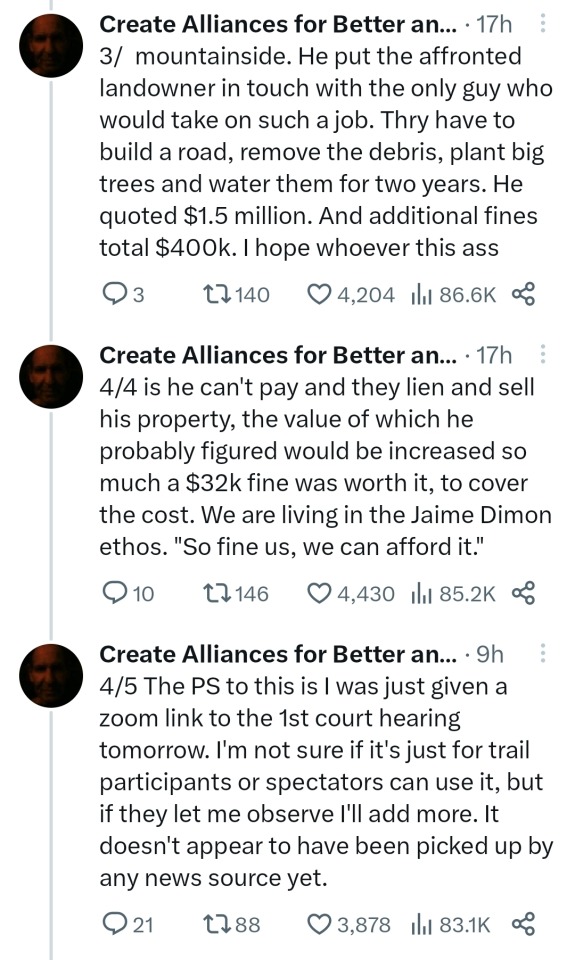

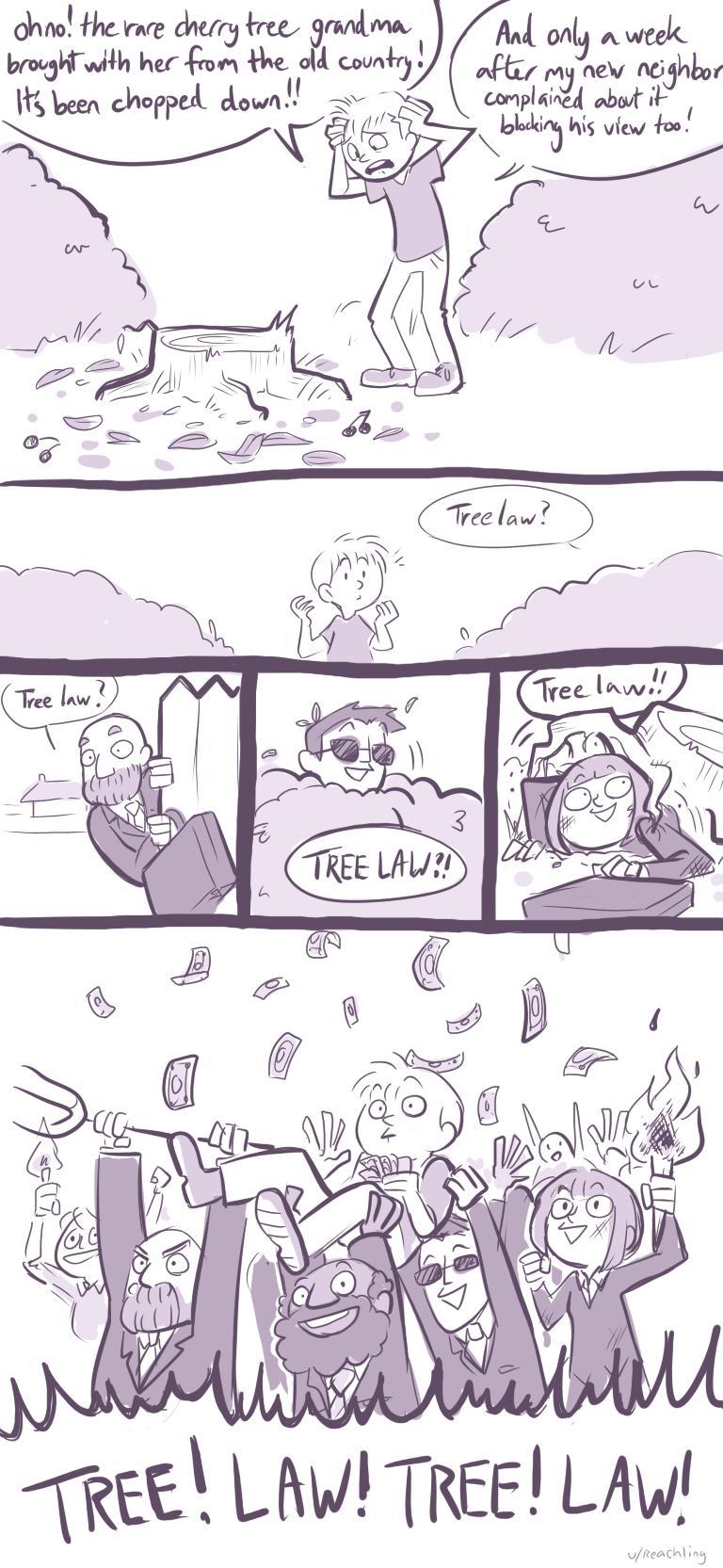
Art by u/reachling
126K notes
·
View notes
Text
Bro, you ok? Bro, humans aren’t separate from the ecosystems around us. We’re a part of them, bro. Bro, we’re never going to have absolutely zero effect on ecosystems, because we live here, bro. Bro, I never said it had to be a bad effect. We don’t have to immediately be perfect either, bro, sometimes doing what you can is what you can, and its way better than nothing. Bro what do you mean humans are a plague. You’re starting to sound a bit like an ecofascist, bro… Bro?
49K notes
·
View notes
Photo
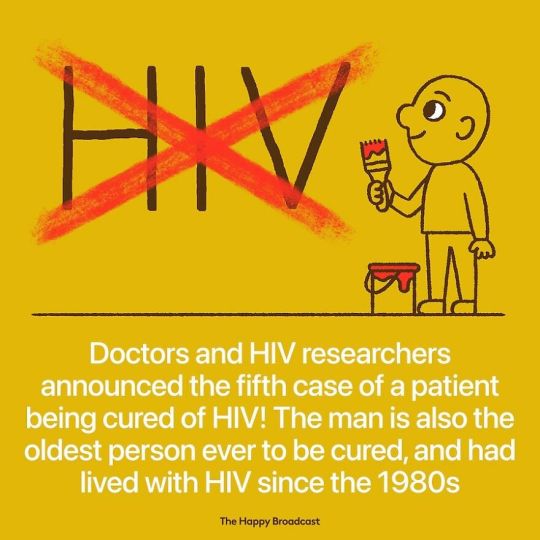



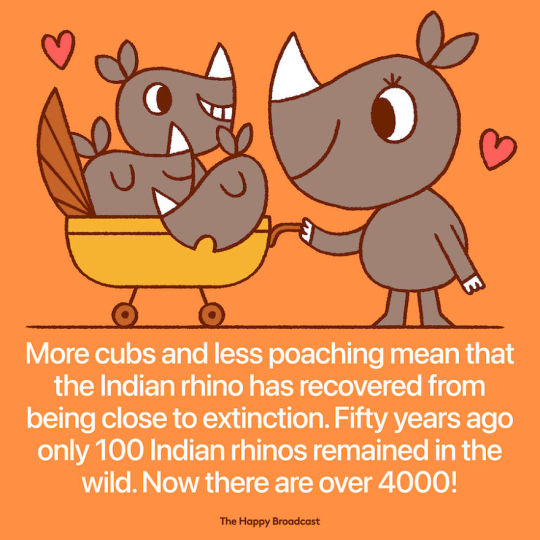

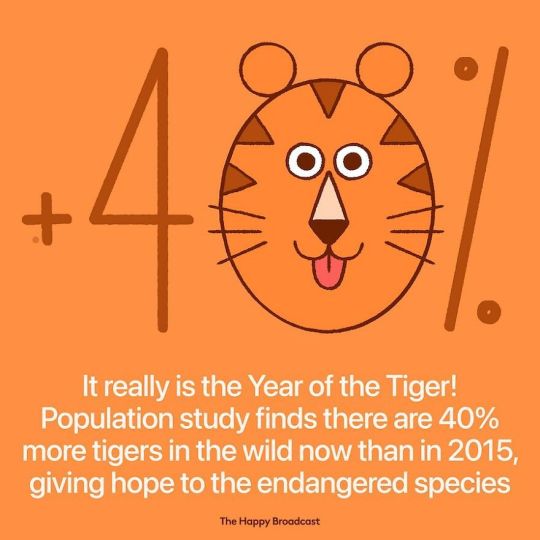



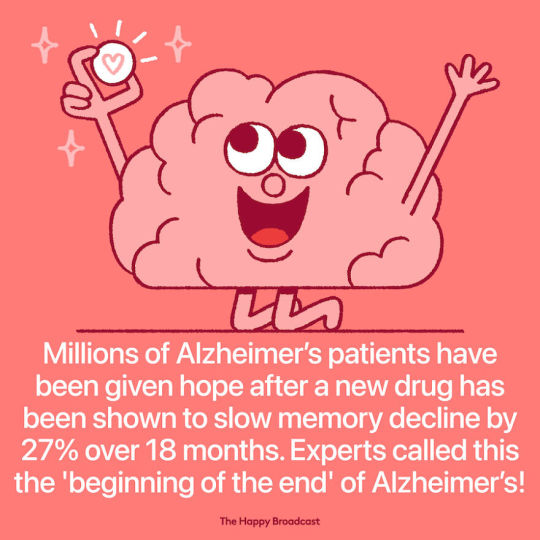




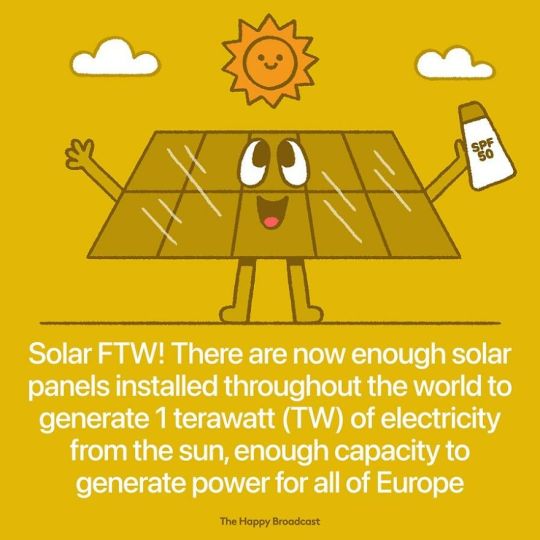



Tons more at the source!
159K notes
·
View notes
Text
"In one of Africa’s last great wildernesses, a remarkable thing has happened—the scimitar-horned oryx, once declared extinct in the wild, is now classified only as endangered.
It’s the first time the International Union for the Conservation of Nature (IUCN), the world’s largest conservation organization, has ever moved a species on its Red List from ‘Extinct in the Wild’ to ‘Endangered.’
The recovery was down to the conservation work of zoos around the world, but also from game breeders in the Texas hill country, who kept the oryx alive while the governments of Abu Dhabi and Chad worked together on a reintroduction program.
Chad... ranks second-lowest on the UN Development Index. Nevertheless, it is within this North African country that can be found the Ouadi Rimé-Ouadi Achim Faunal Reserve, a piece of protected desert and savannah the size of Scotland—around 30,000 square miles, or 10 times the size of Yellowstone.
At a workshop in Chad’s capital of N’Djamena, in 2012, Environment Abu Dhabi, the government of Chad, the Sahara Conservation Fund, and the Zoological Society of London, all secured the support of local landowners and nomadic herders for the reintroduction of the scimitar-horned oryx to the reserve.
Environment Abu Dhabi started the project, assembling captive animals from zoos and private collections the world over to ensure genetic diversity. In March 2016, the first 21 animals from this “world herd” were released over time into a fenced-off part of the reserve where they could acclimatize. Ranging over 30 miles, one female gave birth—the first oryx born into its once-native habitat in over three decades.
In late January 2017, 14 more animals were flown to the reserve in Chad from Abu Dhabi.
In 2022, the rewilded species was officially assessed by the IUCN’s Red List, and determined them to be just ‘Endangered,’ and not ‘Critically Endangered,’ with a population of between 140 and 160 individuals that was increasing, not decreasing.
It’s a tremendous achievement of international scientific and governmental collaboration and a sign that zoological efforts to breed endangered and even extinct animals in captivity can truly work if suitable habitat remains for them to return to."
-via Good News Network, December 13, 2023
#chad#abu dhabi#north africa#rewilding#endangered species#conservation#zoology#conservation biology#oryx#good news#hope#texas#big game#animals#endangered#environmentalism#environmental science#zoo#zoos#zoo animals
24K notes
·
View notes
Text
Pair of Endangered Corpse Flowers Defy Odds to Bloom at Same Time–Now Bearing 700 Seeds https://www.goodnewsnetwork.org/pair-of-endangered-corpse-flowers-defy-odds-to-bloom-at-same-time-now-bearing-700-seeds/
34K notes
·
View notes
Text
It’s solar and wind and tidal and geothermal and hydropower.
It’s plant-based diets and regenerative livestock farming and insect protein and lab-grown meat.
It’s electric cars and reliable public transit and decreasing how far and how often we travel.
It’s growing your own vegetables and community gardens and vertical farms and supporting local producers.
It’s rewilding the countryside and greening cities.
It’s getting people active and improving disabled access.
It’s making your own clothes and buying or swapping sustainable stuff with your neighbours.
It’s the right to repair and reducing consumption in the first place.
It’s greater land rights for the commons and indigenous peoples and creating protected areas.
It’s radical, drastic change and community consensus.
It’s labour rights and less work.
It’s science and arts.
It’s theoretical academic thought and concrete practical action.
It’s signing petitions and campaigning and protesting and civil disobedience.
It’s sailboats and zeppelins.
It’s the speculative and the possible.
It’s raising living standards and curbing consumerism.
It’s global and local.
It’s me and you.
Climate solutions look different for everyone, and we all have something to offer.
#solarpunk#hopepunk#tidalpunk#cottagepunk#bright future#climate justice#environmentalism#optimism#social justice#community#solutions#pluralism#I know stuff like EVs and vertical farms get a bad rep#they are certainly overhyped and slight techbro solutions#but I think all avenues are worth exploring even if inevitably some will be less efficacious and just than others#sorry for the long tags lol
35K notes
·
View notes
Text

Source
More of this
#government#environment#environmentalism#environmetalists#climate science#climate activism#news#current events#Europe#the left#progressive
19K notes
·
View notes
Text
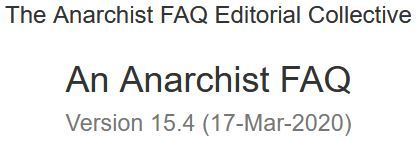
A.2.13 Are anarchists individualists or collectivists?
The short answer is: neither. This can be seen from the fact that liberal scholars denounce anarchists like Bakunin for being “collectivists” while Marxists attack Bakunin and anarchists in general for being “individualists.”
This is hardly surprising, as anarchists reject both ideologies as nonsense. Whether they like it or not, non-anarchist individualists and collectivists are two sides of the same capitalist coin. This can best shown be by considering modern capitalism, in which “individualist” and “collectivist” tendencies continually interact, often with the political and economic structure swinging from one pole to the other. Capitalist collectivism and individualism are both one-sided aspects of human existence, and like all manifestations of imbalance, deeply flawed.
For anarchists, the idea that individuals should sacrifice themselves for the “group” or “greater good” is nonsensical. Groups are made up of individuals, and if people think only of what’s best for the group, the group will be a lifeless shell. It is only the dynamics of human interaction within groups which give them life. “Groups” cannot think, only individuals can. This fact, ironically, leads authoritarian “collectivists” to a most particular kind of “individualism,” namely the “cult of the personality” and leader worship. This is to be expected, since such collectivism lumps individuals into abstract groups, denies their individuality, and ends up with the need for someone with enough individuality to make decisions — a problem that is “solved” by the leader principle. Stalinism and Nazism are excellent examples of this phenomenon.
Therefore, anarchists recognise that individuals are the basic unit of society and that only individuals have interests and feelings. This means they oppose “collectivism” and the glorification of the group. In anarchist theory the group exists only to aid and develop the individuals involved in them. This is why we place so much stress on groups structured in a libertarian manner — only a libertarian organisation allows the individuals within a group to fully express themselves, manage their own interests directly and to create social relationships which encourage individuality and individual freedom. So while society and the groups they join shapes the individual, the individual is the true basis of society. Hence Malatesta:
“Much has been said about the respective roles of individual initiative and social action in the life and progress of human societies … [E]verything is maintained and kept going in the human world thanks to individual initiative … The real being is man, the individual. Society or the collectivity — and the State or government which claims to represent it — if it is not a hollow abstraction, must be made up of individuals. And it is in the organism of every individual that all thoughts and human actions inevitably have their origin, and from being individual they become collective thoughts and acts when they are or become accepted by many individuals. Social action, therefore, is neither the negation nor the complement of individual initiatives, but is the resultant of initiatives, thoughts and actions of all individuals who make up society … [T]he question is not really changing the relationship between society and the individual … [I]t is a question of preventing some individuals from oppressing others; of giving all individuals the same rights and the same means of action; and of replacing the initiative to the few [which Malatesta defines as a key aspect of government/hierarchy], which inevitably results in the oppression of everyone else … “ [Anarchy, pp. 38–38]
These considerations do not mean that “individualism” finds favour with anarchists. As Emma Goldman pointed out, ”‘rugged individualism’… is only a masked attempt to repress and defeat the individual and his individuality. So-called Individualism is the social and economic laissez-faire: the exploitation of the masses by the [ruling] classes by means of legal trickery, spiritual debasement and systematic indoctrination of the servile spirit … That corrupt and perverse ‘individualism’ is the straitjacket of individuality .. [It] has inevitably resulted in the greatest modern slavery, the crassest class distinctions driving millions to the breadline. ‘Rugged individualism’ has meant all the ‘individualism’ for the masters, while the people are regimented into a slave caste to serve a handful of self-seeking ‘supermen.’” [Red Emma Speaks, p. 112]
While groups cannot think, individuals cannot live or discuss by themselves. Groups and associations are an essential aspect of individual life. Indeed, as groups generate social relationships by their very nature, they help shape individuals. In other words, groups structured in an authoritarian way will have a negative impact on the freedom and individuality of those within them. However, due to the abstract nature of their “individualism,” capitalist individualists fail to see any difference between groups structured in a libertarian manner rather than in an authoritarian one — they are both “groups”. Because of their one-sided perspective on this issue, “individualists” ironically end up supporting some of the most “collectivist” institutions in existence — capitalist companies — and, moreover, always find a need for the state despite their frequent denunciations of it. These contradictions stem from capitalist individualism’s dependence on individual contracts in an unequal society, i.e. abstract individualism.
In contrast, anarchists stress social “individualism” (another, perhaps better, term for this concept could be “communal individuality”). Anarchism “insists that the centre of gravity in society is the individual — that he [sic] must think for himself, act freely, and live fully… . If he is to develop freely and fully, he must be relieved from the interference and oppression of others… . [T]his has nothing in common with… ‘rugged individualism.’ Such predatory individualism is really flabby, not rugged. At the least danger to its safety, it runs to cover of the state and wails for protection… .Their ‘rugged individualism’ is simply one of the many pretences the ruling class makes to mask unbridled business and political extortion.” [Emma Goldman, Op. Cit., pp. 442–3]
Anarchism rejects the abstract individualism of capitalism, with its ideas of “absolute” freedom of the individual which is constrained by others. This theory ignores the social context in which freedom exists and grows. “The freedom we want,” Malatesta argued, “for ourselves and for others, is not an absolute metaphysical, abstract freedom which in practice is inevitably translated into the oppression of the weak; but it is a real freedom, possible freedom, which is the conscious community of interests, voluntary solidarity.” [Anarchy, p. 43]
A society based on abstract individualism results in an inequality of power between the contracting individuals and so entails the need for an authority based on laws above them and organised coercion to enforce the contracts between them. This consequence is evident from capitalism and, most notably, in the “social contract” theory of how the state developed. In this theory it is assumed that individuals are “free” when they are isolated from each other, as they allegedly were originally in the “state of nature.” Once they join society, they supposedly create a “contract” and a state to administer it. However, besides being a fantasy with no basis in reality (human beings have always been social animals), this “theory” is actually a justification for the state’s having extensive powers over society; and this in turn is a justification of the capitalist system, which requires a strong state. It also mimics the results of the capitalist economic relations upon which this theory is built. Within capitalism, individuals “freely” contract together, but in practice the owner rules the worker for as long as the contract is in place. (See sections A.2.14 and B.4 for further details).
Thus anarchists reject capitalist “individualism” as being, to quote Kropotkin, “a narrow and selfish individualism” which, moreover, is “a foolish egoism which belittles the individual” and is “not individualism at all. It will not lead to what was established as a goal; that is the complete broad and most perfectly attainable development of individuality.” The hierarchy of capitalism results in “the impoverishment of individuality” rather than its development. To this anarchists contrast “the individuality which attains the greatest individual development possible through the highest communist sociability in what concerns both its primordial needs and its relationships with others in general.” [Selected Writings on Anarchism and Revolution, p. 295, p. 296 and p. 297] For anarchists, our freedom is enriched by those around us when we work with them as equals and not as master and servant.
In practice, both individualism and collectivism lead to a denial of both individual liberty and group autonomy and dynamics. In addition, each implies the other, with collectivism leading to a particular form of individualism and individualism leading to a particular form of collectivism.
Collectivism, with its implicit suppression of the individual, ultimately impoverishes the community, as groups are only given life by the individuals who comprise them. Individualism, with its explicit suppression of community (i.e. the people with whom you live), ultimately impoverishes the individual, since individuals do not exist apart from society but can only exist within it. In addition, individualism ends up denying the “select few” the insights and abilities of the individuals who make up the rest of society, and so is a source of self-denial. This is Individualism’s fatal flaw (and contradiction), namely “the impossibility for the individual to attain a really full development in the conditions of oppression of the mass by the ‘beautiful aristocracies’. His [or her] development would remain uni-lateral.” [Peter Kropotkin, Anarchism, p. 293]
True liberty and community exist elsewhere.
#faq#anarchy faq#revolution#anarchism#daily posts#communism#anti capitalist#anti capitalism#late stage capitalism#organization#grassroots#grass roots#anarchists#libraries#leftism#social issues#economy#economics#climate change#climate crisis#climate#ecology#anarchy works#environmentalism#environment#solarpunk#anti colonialism#mutual aid#cops#police
22 notes
·
View notes
Text
hey uh so I haven't seen anyone talking about this here yet, but
the amazon river, like the biggest river in the fucking world, in the middle of the amazon fucking rainforest, is currently going through its worst drought since the records began 121 years ago
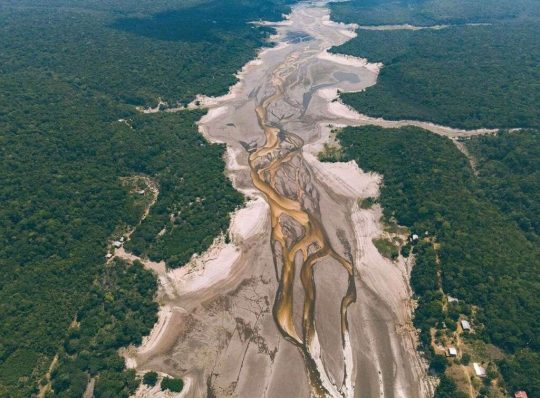
picture from Folha PE
there's a lot going on but I haven't seen much international buzz around this like there was when the forest was on fire (maybe because it's harder to shift the narrative to blame brazil exclusively as if the rest of the world didn't have fault in this) so I wanted to bring this to tumblr's attention
I don't know too many details as I live in the other side of the country and we are suffering from the exact opposite (at least three cyclones this year, honestly have stopped counting - it's unusual for us to get hit by even one - floods, landslides, we have a death toll, people are losing everything to the water), but like, I as a brazilian have literally never seen pictures of the river like this before. every single city in the amazonas state is in a state of emergency as of november 1st.
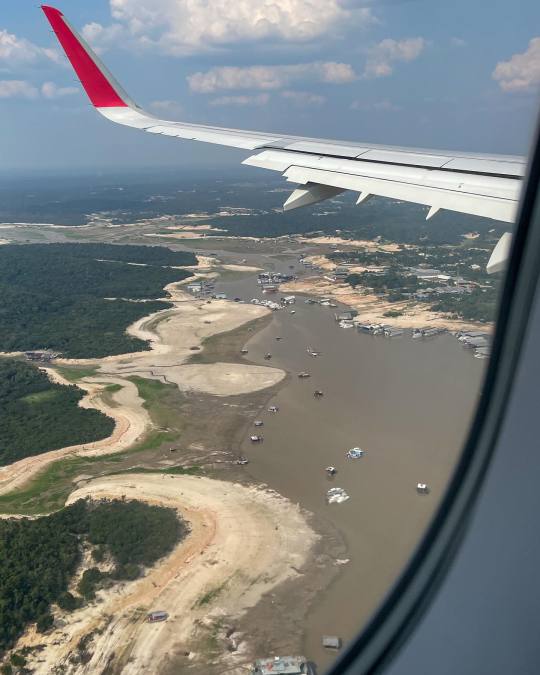

pictures by Adriano Liziero (ig: geopanoramas)
we are used to seeing images of rio negro and solimões, the two main amazon river affluents, in all their grandiose and beauty and seeing these pictures is really fucking chilling. some of our news outlets are saying the solimões has turned to a sand desert... can you imagine this watery sight turning into a desert in the span of a year?
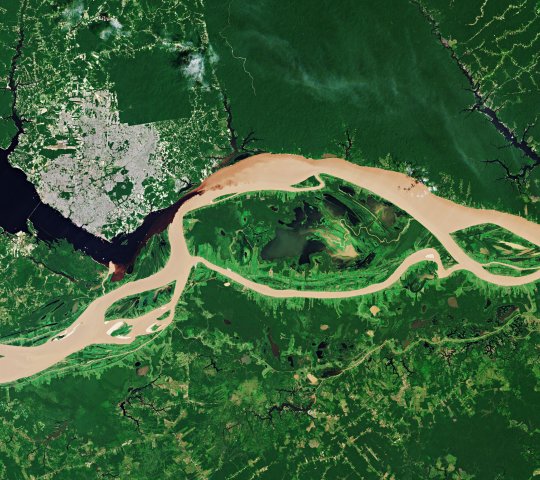
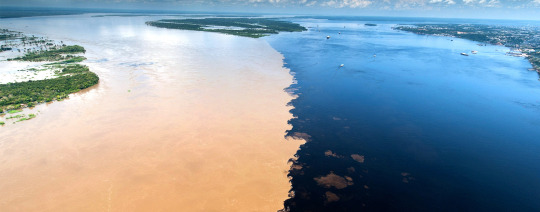
while down south we are seeing amounts of rain and hailstorms the likes of which our infrastructure is simply not built to deal with, up north people who have built everything around the river are at a loss of what to do.
the houses there that are built to float are just on the ground, people who depend on fishing for a living have to walk kilometers to find any fish that are still alive at all, the biodiversity there is at risk, and on an economic level it's hard to grasp how people from the northern states are getting by at all - the main means of transport for ANYTHING in that region is via the river water. this will impact the region for months to come. it doesnt make a lot of sense to build a lot of roads bc it's just better to use the waterway system, everything is built around or floats on the river after all. and like, the water level is so incomprehensibly low the boats are just STUCK. people are having a hard time getting from one place to another - keep in mind the widest parts of the river are over 10 km apart!!

this shit is really serious and i am trying not to think about it because we have a different kind of problem to worry about down south but it's really terrifying when I stop to think about it. you already know the climate crisis is real and the effects are beyond preventable now (we're past global warming, get used to calling it "global boiling"). we'll be switching strategies to damage control from now on and like, this is what it's come to.
I don't like to be alarmist but it's hard not to be alarmed. I'm sorry that I can't end this post with very clear intructions on how people overseas can help, there really isn't much to do except hope the water level rises soon, maybe pray if you believe in something. in that regard we just have to keep pressing for change at a global level; local conditions only would not, COULD NOT be causing this - the amazon river is a CONTINENTAL body of water, it spans across multiple countries. so my advice is spread the word, let your representatives know that you're worried and you want change towards sustainability, degrowth and reduced carbon emissions, support your local NGOs, maybe join a cause, I don't know? I recommend reading on ecological and feminist economics though
however, I know you can help the affected riverine families by donating to organizations dedicated to helping the region. keep in mind a single US dollar, pound or euro is worth over 5x more in our currency so anything you donate at all will certainly help those affected.
FAS - Sustainable Amazon Fundation
Idesam - Sustainable Developent and Preservation Institute of Amazonas
Greenpeace Brasil - I know Greenpeace isn't the best but they're one of the few options I can think of that have a bridge to the international world and they are helping directly
There are a lot of other smaller/local NGOs but I'm not sure how you could donate to them from overseas, I'll leave some of them here anyway:
Projeto Gari
Caritás Brasileira
If you know any other organizations please link them, I'll be sure to reblog though my reach isn't a lot
thank you so much for reading this to the end, don't feel obligated to share but please do if you can! even if you just read up to here it means a lot to me that someone out there knows
also as an afterthought, I wanted to expand on why I think this hasn't made big news yet: because unlike the case of the 2020 forest fires, other countries have to hold themselves accountable when looking at this situation. while in 2020 it was easier to pretend the fires were all our fault and people were talking about taking the amazon away from us like they wouldn't do much worse. global superpowers have no more forests to speak of so I guess they've been eyeing what latin america still has. so like this bit of the post is just to say if you're thinking of saying anything of the sort, maybe think of what your own country has done to contribute to this instead of blaming brazil exclusively and saying the amazon should be protected by force or whatever
#solarpunk#sustainability#environmentalism#climate change#climate crisis#global warming#amazon rainforest#amazon river#geography#brazil#degrowth#punk#global boiling#ecopunk#anti capitalism#climate action#climate activism#the world does not die on my watch#i saw someone use that tag and uh i like it we should make it a thing#long post#:/ sorry i know no one likes lengthy bad news posts on their dashes but i've been thinking about this quite a bit#and i don't really know what to do to help bc i don't have money to donate and i am 10 thousand km away#i think i could be doing more to help but i am already trying my best#again dont feel obligated to share or read this but it would be nice and i would love you forever#have removed lbv from the post
7K notes
·
View notes